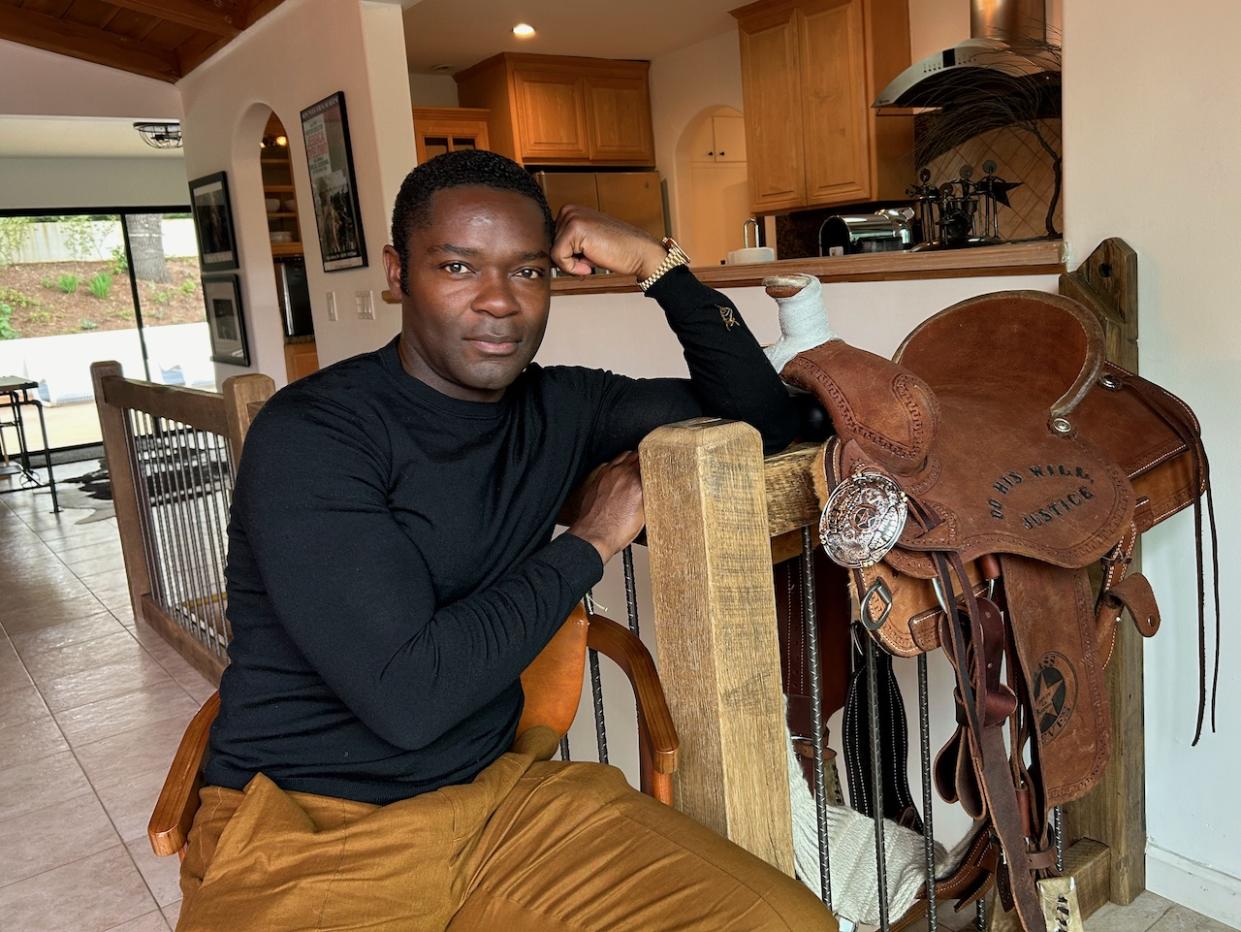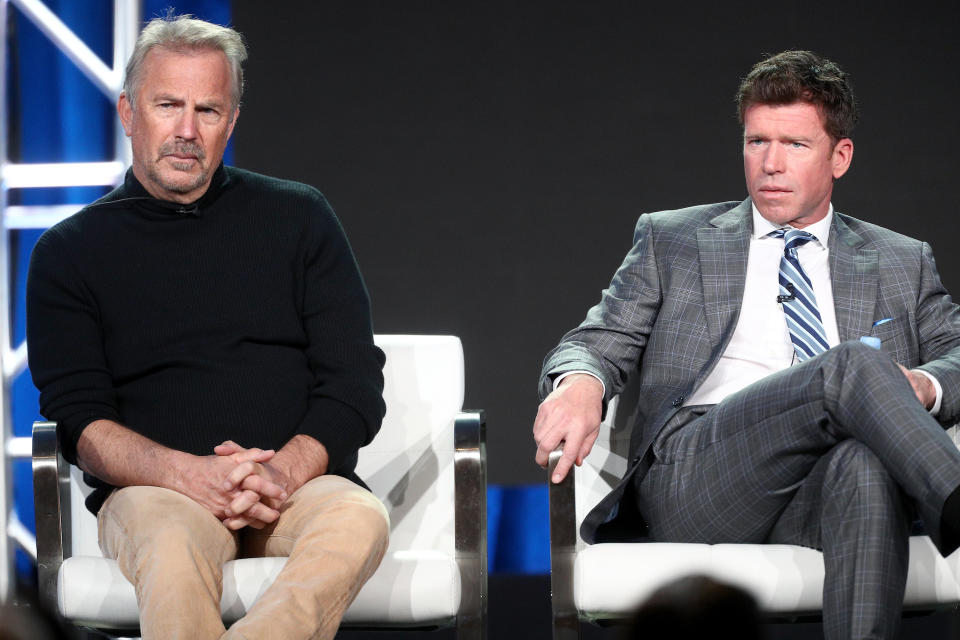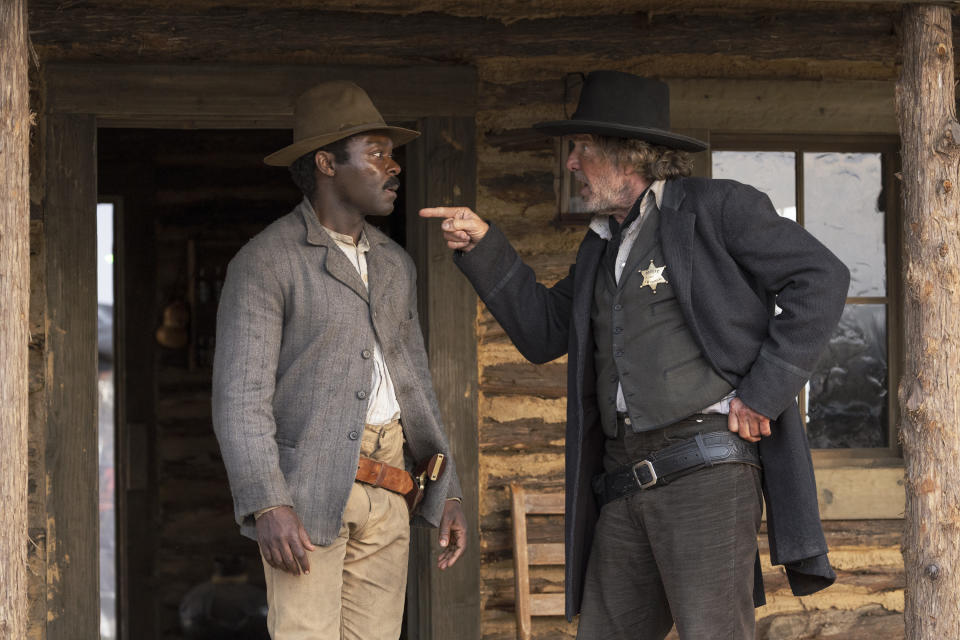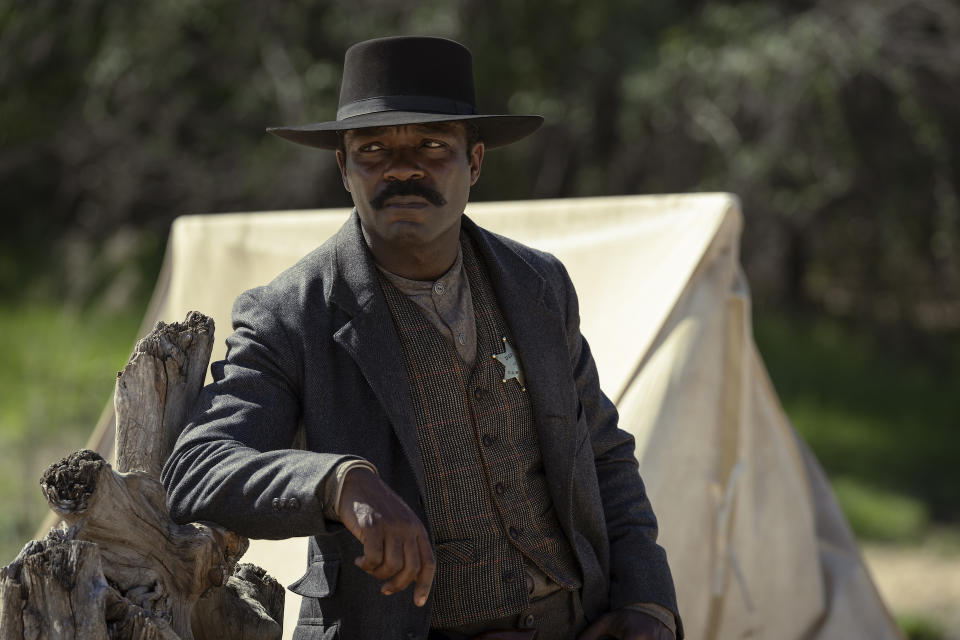David Oyelowo’s Long Obsession with the Real-Life Bass Reeves Finally Yielded a Groundbreaking Western Series

For some 10 years, British-American actor-producer David Oyelowo has nurtured his obsession with the legendary post-Civil War Deputy U.S. Marshall Bass Reeves — long considered an inspiration for the Lone Ranger, with his white horse and Native American sidekick. Others had tried to make movies about him. Morgan Freeman, for one, spent some three decades pushing the project forward, to no avail. Always, there was resistance to centering a project on a Black lawman.
“You simply cannot avoid the question of race,” said Oyelowo at his spacious home in the San Fernando Valley. “Because arguably, the most, if not one of the most beloved genres, certainly, in American cinema is the Western. The narrative in our business, ‘Black doesn’t travel,’ ‘Black is niche,’ ‘Black is not global,’ therefore, does not warrant the level of budget.”
More from IndieWire
As time passed, mounting a Western set in the 1800s only became more expensive. “The further away you get, the less likely that character is deemed to be worthy of the correct platforming,” said Oyelowo. “In my journey as an actor, whether it be ‘Selma,’ or ‘The Butler,’ or even ‘Red Tails,’ I watched each and every time, on the basis of race, those films be incredibly challenged in terms of them coming to fruition. We made [‘Selma’] for $20 [million]; Oprah had to put in $2 million of her own money to get us to where we needed to get. We were only able to finish [‘The Butler’] because a hurricane hit the production and the insurance money came in. That [$25-million] movie goes on to make $172 million, and no one wanted that film.”
Even when “Black Panther” and its sequel demolished the conventional wisdom about who would watch a movie where, the needle didn’t move that much, said Oyelowo. “When there is Black success of that nature, immediately the phrases come out: ‘It overperformed, it’s anomalous, it’s a unicorn, it’s a one-off.’ So the pervasive narrative is: There can only be one. You see it with Black actors. When a star rises, that can have a detrimental effect on everyone else, because we now have our one. We have our Sidney Poitier, we have our Obama, we have our Denzel. So now that enables us to sleep well in our beds, because we’re doing something good optically. And it enables us to keep on doing what we actually want to do, because there is a token of this gesture. We saw that exponentially in the wake of George Floyd’s murder and the Black Lives Matter movement. We saw all of this performative, demonstrative, white-guilt ridden stuff. The reason you can tell it’s not bone deep is how quickly that movement has receded into the rear view.”
It didn’t help “Bass Reeves” that the Western as a genre goes in and out of favor in Hollywood. “A great movie is a great movie,” said Oyelowo, “and our business shapes narratives around the intangible in order to make it understandable. When we went out with ‘Bass’ in 2015, the entire industry said, ‘we’re not making Westerns because no one’s making Westerns.’ Literally two years later, the narrative was, ‘everyone’s making Westerns so we’re not doing that, the market is saturated.’ It’s entirely rooted in opinion, based on a largely specific demographic of decision makers: White, male, and middle-aged.”

The big shift that made this series possible was online viewing. “Streaming comes along and we now have raw data as to who is watching,” said Oyelowo, “who is over-indexing. And now you have platforms that are truly global. So it’s not the decision of some head of a studio in Burbank as to whether that film has a domestic release and is worthy of an international release.”
Taylor Sheridan Western “Yellowstone,” which started out well enough, exploded during the pandemic when viewers were stuck at home. Suddenly, it was indisputable that there was an audience for a genre that was supposedly out of fashion. Back when Dimension’s David Glasser, who now helps to run Sheridan’s empire, flirted with “Bass Reeves,” the executive became familiar with the project and helped Oyelowo to make an overall deal for television at Paramount. After meeting Sheridan at Sundance, Oyelowo talked to him on the phone and was amazed that he knew all about Bass Reeves. “He was the only person I spoke to who was as knowledgeable and seemingly as passionate about the character,” said Oyelowo. “And so we geeked out over it on the phone. Of course, he had laid a foundation whereby it was pretty difficult for anyone, including Paramount, to argue about the validity of the character, in the wake of the Black Lives Matter movement, we are in the wake of a period where the engagement with streaming has gone up exponentially because of the pandemic, we have ‘Yellowstone,’ we have ‘1883.’”
That pioneer series proved to be the comp that “Lawmen: Bass Reeves” needed. “The aggregation of all of those things is what made it inexorable,” said Oyelowo. When “Bass Reeves” finally aired on Paramount+, it brought an upswing of Black and Brown subscriptions. “Anecdotally for me, and this was then supported by data, was the multi-generational viewing, especially African-American men who had grown up loving ‘Gunsmoke’ and ‘Have Gun Will Travel,’ but never saw themselves represented.”
“Lawmen: Bass Reeves” broke right before Thanksgiving and went into Christmas. “I heard time and again, ‘My grandfather, my father forced me to sit down and watch a Western. I don’t like Westerns, but boy do I love ‘Bass Reeves.’ They got old, they got young, and they got very young. That image of me on that white horse is a gift to my six-year-old self. I loved watching ‘The Lone Ranger.’ My mom’s broom was my horse and I was a cowboy. And I had always imagined myself in that stance, rearing a horse.”

The 48-year-old actor, who is known for his cerebral and emotive roles more than athletic, spent a year training to ride a horse on different terrain and learning tricks. Bass Reeves “was an incredibly strong guy,” said Oyelowo. “You cannot survive that terrain without being that way. They lived outdoors most of the time. He was on that horse most days. I spent 15 months in a gym making sure that I was strong enough to not get injured over the six months of shooting. I wasn’t ever thrown. Because, again, Taylor has it dialed in; it’s the team he’s assembled.”
The trickiest sequence was during the Civil War, when he gallops into battle. “The cannon was so loud that it made the horses quite skittish. There’s this moment where all these horses run down this hill towards me, and there was one take where they kept coming. And they were just not enough wranglers to stop all these loose horses running at me. And so I just had to remain on that horse and hope that my horse wasn’t going to take off after them. That was pretty hairy.”
Sheridan didn’t write, produce, or direct, serving more as a godfather to the project. Instead, they brought in showrunner Chad Feehan, who was born and raised in Texas, “who had deep knowledge of the story, which was rare for me to come across,” said Oyelowo. “But also just a phenomenally talented writer. I said to him, ‘we have to try to make a Western for people who don’t like Westerns. It’s not going to be enough for it to just be a great Western, because the character is bigger than that. The history is bigger than that.'”

One way to add heart to the series was to focus on Reeves’ family and the work-life balance. “We’re both family men, both love our wives, have a bunch of kids,” said Oyelowo. “What happens if you have this really demanding job, it takes you on the road for several months, you have these people you love, and the challenge is constantly trying to get back to them?”
The other dramatic arc for the series was the illiterate slave Reeves’ unrelenting pursuit of justice. “The drama goes up exponentially when you have one of the most dangerous jobs in America at that time,” said Oyelowo. “When you’re just coming out of being enslaved, now you’re empowered to arrest some of the very people the likes of which enslaved you.”
Generally, Oyelowo dislikes slave narratives. “I don’t have any desire to be in them,” he said. “I find them difficult to watch because they’re incredibly triggering. I feel like we’ve seen more of those than we’ve seen aspirational representations of Blackness, especially in a historical context. We’ve seen a lot of pain which there has been, that’s indisputable. We have to work through that. Yes, we have the context of the reality of the brutality of slavery. But now let’s start talking about the triumphant side of things so that we can own the history a bit more because it’s not purely rooted in pain and trauma. Bass Reeves was enslaved but quickly he goes towards being empowered and does it in a way that transcends anything a white person could do. A white person cannot relate to centuries of slavery as your legacy, then going into being a deputy US Marshal who chooses to be a purveyor of justice in an inherently unjust environment. And he wrestles with that.”
The trick with the series was to make it fun and accessible for everyone while still addressing these complexities of history. “One of the things I loved about playing Bass Reeves is that, despite everything he had been through, despite everything he had been denied, he often was the smartest guy in the room,” said Oyelowo. “And he learned some of those skills that he applied to being a Deputy U.S. Marshal from Native Americans in that time where he was in exile, having escaped the brutality. His people had been stolen from their continent to build this country; their people have been stolen from in order for America to become what it became.”
Lawman Bass Reeves is a laconic figure who doesn’t have much to say. “He’s a man of few words,” said Oyelowo. “And those tend to be the wisest people. You learn more by listening than talking and he had a massive learning curve considering where he came from and what he was deployed to do.”
Near the end of the series, Reeves pleads his case to his boss, Judge Isaac Parker (Donald Sutherland), expressing himself freely. “That is one of my favorite scenes in the show,” said Oyelowo, “because you finally get to understand just how tough a line he had had to walk between [his master] George Reeves as played by Shea Whigham and Judge Isaac Parker as played by Donald Sutherland. You have two men, arguably on opposite ends of the spectrum, his enslaver and his empowerer, but for Bass both are inherently problematic because they are white men who represent a certain power structure in America at that time that has spent a lot of energy keeping someone like Bass Reeves subjugated. In that moment with Donald Sutherland’s character towards the end, you see him articulating just how difficult a line it is for him to toe and the fact that he feels like he’s been drawn into the inexorable vortex of being a weapon against his own people, because justice is inherently different for Black people than it is for white people.”
Finding the right balance for Reeves’ accent — comprehensible yet authentic — was a challenge.
“I worked with a great dialect coach by the name of Denise Woods,” he said. “We studied court transcripts of Bass Reeves, where all the intonation is in there.” Recordings were less useful but provided a sense of the West African rhythms. “Now I’m from Nigeria, I’m from West Africa, my parents had that accent. We were able to absolutely trace that sound. I had a connection because I know what West African accents feel like. And that’s the root of the African American accent.”
Next up: Oyelowo’s production company Yoruba Saxon boasts a first-look TV and film deal at Apple TV+, where he just wrapped the ’60s half-hour TV series “Government Cheese,” “a parabolic surrealist absurdist comedy,” he said. And he’s returning to his theater roots to star as Shakespeare’s “Coriolanus” at The National Theater.
As for who should be the next “Lawmen,” he has ideas. “We built it as an anthology,” he said. “A lot of people didn’t know who Bass Reeves was, unjustly, in my opinion. But there are a lot of incredible Mexican, Native American, and Asian historical figures in that region at that time doing extraordinary things. People don’t know that one in three cowboys was Black, the very phrase cowboy was a racial epithet. They were called cow punchers until there were just so many Black cow punchers that they started being called cowboys. But there are stories like that in so many other demographics that have been marginalized now and through history and so my hope is there will be “Lawmen: Calamity Jane.”
Count me in.
Best of IndieWire
2023 Emmy Predictions: Who Will Win at the Primetime Emmy Awards?
2023 Emmy Predictions: Outstanding Documentary or Nonfiction Special
2023 Emmy Predictions: Outstanding Documentary or Nonfiction Series
Sign up for Indiewire's Newsletter. For the latest news, follow us on Facebook, Twitter, and Instagram.

 Yahoo News
Yahoo News 
